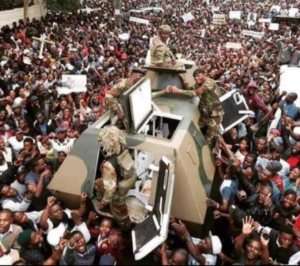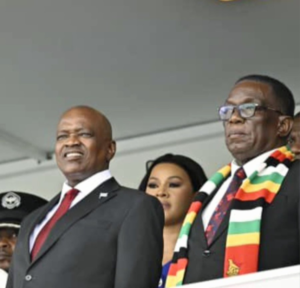ZIMBABWE BROADCASTING TAKEOVER: INSIDER APPOINTMENT SIGNALS DEEPENING STATE MEDIA CAPTURE

In a move that could potentially reshape the landscape of media freedom in Zimbabwe, Charles Munganasa, the leader of the Zanu PF Youth League, has been appointed as the acting chief executive of the Zimbabwe Broadcasting Corporation (ZBC). Munganasa, who also serves as the Zanu PF Masvingo provincial Youth League secretary for administration, already held a position as a member of the ZBC board. This development is seen by many as the final step in the official capture of the state broadcaster, which is ideally supposed to operate as an impartial public entity.
ZBC’s board, overseen by Helliate Rushwaya – President Emmerson Mnangagwa’s niece – has come under fire for what many believe to be a clear conflict of interest that jeopardizes journalistic independence. The appointment of Munganasa replaces Assael Machakata, the ZBC finance director, who had been serving as the acting chief executive since February. This followed the suspension and eventual resignation of the former CEO, Adelaide Chikunguru.
The installation of Munganasa is viewed not only as a consolidation of control by the ruling party but as a direct threat to the very essence of journalistic integrity and professional standards. Governments and powerful interest groups around the world have long aimed to tighten their grip on the media, often resulting in a severe contraction of journalistic freedom and a stark undermining of the media’s role as a public good.
Media capture, the term used to describe this phenomenon, involves a series of self-serving control mechanisms executed through calculated and premeditated steps. These steps typically include overtaking regulatory frameworks, influencing operations in state-owned media, monopolizing public advertising, and fostering politically linked ownership of private media outlets. Such tactics are becoming increasingly prevalent in Zimbabwe, undermining the foundational principles of free and independent journalism.
The situation at ZBC highlights the inherent vulnerabilities faced by state-owned media entities, which, by their nature, are prone to interference and manipulation by governmental forces. However, the structure, management, and operational modalities of ZBC amplify these risks, posing a serious challenge to the notion of media as an unbiased pillar of democracy.
Critics argue that this trend not only stifles the voice of the people but also erodes the checks and balances necessary for a healthy democratic society. The media’s role in holding power to account, providing a platform for diverse voices, and facilitating informed public discourse is crucial. Yet, when the media falls under the sway of those in power, these functions are severely compromised, leading to a landscape where misinformation can flourish unchecked and public trust in the media is diminished.
The broader implications of such media capture in Zimbabwe are profound. As the state broadcaster, ZBC has a significant influence over the public perception of governance and policy. With the media landscape increasingly skewed towards the ruling party’s narrative, the opportunity for opposition voices and critical perspectives to reach the public diminishes. This not only impacts the democratic process but also affects how Zimbabwe is viewed on the international stage, potentially impacting foreign relations and economic prospects.
In response to these developments, media watchdogs and democracy advocates within and outside Zimbabwe are calling for urgent reforms. These include the implementation of measures to safeguard the autonomy of the media, enhance regulatory frameworks to prevent political interference, and promote a diverse and pluralistic media environment that can thrive free from the shadows of political dominance.
As Zimbabwe continues down this precarious path, the hope remains that a collective awareness and resistance from civil society, coupled with international support, can steer the nation back towards a media environment that truly serves the public interest, fosters accountability, and upholds the pillars of democracy.



